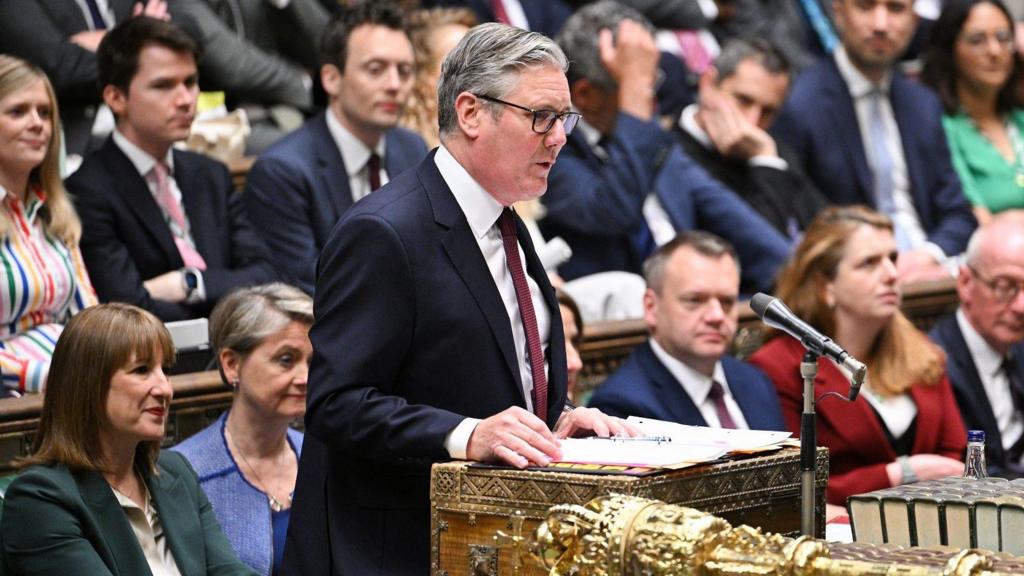Sir Keir Starmer has notably refrained from dismissing the possibility of extending the freeze on tax thresholds, a measure that has pushed millions into higher tax brackets.
The existing freeze on National Insurance (NI) and income tax thresholds, initially implemented by the Conservative government, is slated to conclude in April 2028.
During Prime Minister’s Questions, when questioned about whether the government still intended to lift the freeze, Sir Keir limited his response to affirming his commitment to Labour’s election manifesto.
While the manifesto pledged not to raise National Insurance, income tax, or VAT, it did not include a specific commitment regarding tax thresholds.
Recent policy reversals concerning disability benefits and winter fuel payments for pensioners have intensified pressure on the government’s fiscal planning, leading economists to suggest potential tax increases in the upcoming autumn Budget.
Following substantial concessions on the government’s key benefits proposals, anticipated savings of approximately £5 billion may now be delayed or entirely forfeited.
Tax thresholds, which define the income levels at which individuals begin paying National Insurance or income tax, or become subject to higher rates, have traditionally been adjusted annually in line with inflation.
However, income tax thresholds have remained frozen since the 2021/22 fiscal year.
This stagnation poses the risk of individuals being moved into higher tax brackets, or becoming liable for income tax for the first time, should they receive a pay increase.
Extending the freeze through 2029/30 could generate an estimated £7 billion per year.
In her Budget address last autumn, Chancellor Rachel Reeves stated that prolonging the freeze “would hurt working people” and pledged to reinstate inflation-linked threshold adjustments from 2028/29.
However, when challenged by Conservative leader Kemi Badenoch about whether this remained government policy, Sir Keir declined to rule out a continuation of the freeze.
“No prime minister or chancellor is going to write a Budget in advance. We are absolutely fixed on our fiscal rules. We remain committed to them,” he told the Commons.
“We remain committed to our Budget, to our manifesto commitments.”
The Prime Minister’s response contrasted with his previous answer to Badenoch, when questioned about upholding Labour’s pledge not to increase income tax, National Insurance, or VAT.
His reply in that instance was a simple: “Yes.”
The government’s self-imposed fiscal rules mandate avoiding borrowing for day-to-day spending and ensuring that government debt decreases as a proportion of national income by 2029/29.
These rules are intended to reassure financial markets, but adherence to them restricts the government’s flexibility and increases the likelihood of tax increases.
Badenoch argued that a continued freeze would mean “millions of our poorest pensioners face being dragged into income tax for the first time ever”, characterizing it as a “retirement tax.”
Badenoch also accused Sir Keir of “flirting” with the idea of a wealth tax – a measure advocated by some Labour MPs on the left wing of the party.
Proponents of the concept suggest that a new 2% tax on assets exceeding £10 million could generate £24 billion annually.
However, critics contend that such a policy could prompt wealthy individuals to relocate abroad.
Badenoch told the Commons: “Let’s be honest about what that means, this is a tax on all of our constituents’ savings, on their houses, on their pensions, it would be a tax on aspiration.”
When asked if he would rule out a wealth tax, Sir Keir stated that Labour had stabilized the economy and “don’t need lessons” from the Conservatives.
Pressed again on whether he would introduce a wealth tax by Green MP Adrian Ramsay, who suggested “those with the broadest shoulders should carry the largest burden”, Sir Keir responded: “We can’t just tax our way to growth.”
Sign up for our Politics Essential newsletter to read top political analysis, gain insight from across the UK and stay up to speed with the big moments. It’ll be delivered straight to your inbox every weekday.
Downing Street is hoping to finalize a deal with the French President this week to tackle small boat crossings
There are high hopes for Macron’s three-day visit, but how close can the nations really become given past mistrust over Brexit negotiations?
What’s gone wrong for Labour? 2024 voters delve into it, writes Laura Kuenssberg.
North East & Cumbria political editor Richard Moss looks back at Labour’s first year in power.
Nick Robinson sits down with the prime minister to look back at his first year in Downing Street.

